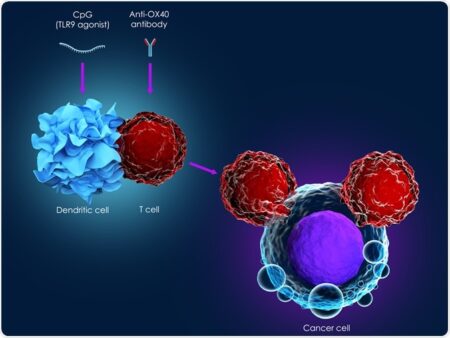Source: www.drewreportsnews.com
Author: Drew Simms
City of Hope researchers have actually combined two potent immunotherapies– an oncolytic infection and chimeric antigen receptor (CAR) T cell therapy– to target and remove solid growths that are otherwise difficult to treat with CAR T treatment alone, according to a brand-new Science Translational Medication study.
In pre-clinical research that could lead to a medical trial for clients with intractable solid tumors, City of Hope scientists genetically crafted an oncolytic virus to go into growth cells and require their expression of CD19 protein on their cell surface area. Scientists were then able to use CD19-directed CAR T cells to recognize and attack these solid tumors.
CD19-CAR T cell therapy is authorized by the U.S. Fda to treat particular types of blood cancers, specifically B cell lymphomas and intense lymphoblastic leukemia. This brand-new research might broaden using CD19-CAR T cells for the treatment of patients with possibly any strong tumor.
“Our research demonstrates that oncolytic viruses are a powerful and promising approach that can be combined strategically with CAR T cell therapy to more effectively target solid tumors” said Saul Priceman, Ph.D., the study’s senior author and an assistant professor in City of Hope’s Department of Hematology & Hematopoietic Cell Transplantation.
“In addition, this therapeutic platform addresses two major challenges that make solid tumors so difficult to treat with immunotherapy. There are limited, established solid tumor targets that T cells can be redirected against with CARs,” Priceman added. “Furthermore, solid tumors are surrounded by a brick wall — a so-called immunosuppressive tumor microenvironment. When a CAR T cell attempts to enter the tumor, survive, and kill cancer cells, it can’t effectively because of this barrier.”
Yuman Fong, M.D., the Sangiacomo Family Chair in Surgical Oncology at City of Hope and a leading researcher who is developing oncolytic infections for cancer treatment, included that the virus had the ability to break through that barrier.
“We designed this oncolytic virus to do what it does so well,” Fong said. “It entered the cancer cell and used the cell’s own machinery to replicate itself, and engineer the cancer cells to express a truncated form of the well-known CAR T cell target, CD19.”
Researchers first produced an oncolytic infection (OV19t) in Fong’s lab to enter into tumor cells and start producing truncated CD19 (CD19t). They did this successfully in triple-negative breast cancer lines, along with in pancreatic, prostate, ovarian, and head and neck cancer, as well as brain growth cells. CD19-CAR T cells were then integrated with OV19t in vitro and in healing studies in mice.
Scientists found several crucial findings
“When we infected tumor cells with the virus, we observed the first signal that this may work. CD19t was being expressed by tumor cells much sooner than the virus was able to kill them, giving us a window of opportunity to be targeted by CD19-CAR T cells,” said Anthony Park, Ph.D., a postdoctoral fellow in Priceman’s lab. “The combination of the two had a powerful, synergistic effect.”
Researchers also revealed that mice already treated of their cancer with the oncolytic infection and CAR T cell combination showed extended protective anti-tumor resistance.
“The immune system built a memory response to the tumor,” Park added. “Once it eradicated tumors, following the initial combination treatment, the mice were shielded against tumor recurrences.”
Solid growths are frequently immunologically cold, which implies they are not usually responsive to therapies that utilize the body’s own immune system to eliminate cancer, Park said. Introducing the virus reversed the tumor’s harsh microenvironment, making it more receptive to receiving CAR T cell treatment.
The research study shows City of Hope’s collective technique to finding much better immunotherapy cancer treatments. A couple of years back, Priceman, Fong and Stephen Forman, M.D., leader of City of Hope’s Hematologic Malignancies Research Institute, satisfied to conceptualize how they might integrate their know-how, namely oncolytic infection and CAR T cell treatments, to target solid growths.
“It was a simple concept but one that took many steps to get us to where we are today — we are now designing a clinical trial to test this combination in patients,” said Priceman.
The trial would initially check the safety of OV19t in clients with solid growths. If that is found to be safe and effective, the oncolytic virus and CAR T cell treatment could then be checked in sequence. The trial is anticipated to begin in 2022.
City of Hope, an acknowledged leader in CAR T cell treatments for blood cancers and strong growths, has actually dealt with more than 500 clients because its CAR T program begun in the late 1990s. The organization continues to have among the most comprehensive CAR T cell clinical research study programs on the planet. It currently has 30 ongoing CAR T scientific trials, consisting of CAR T trials for blood cancers and several strong growth types such as primary and metastatic brain growths, metastatic castration resistant prostate cancer, and more.


Leave A Comment
You must be logged in to post a comment.